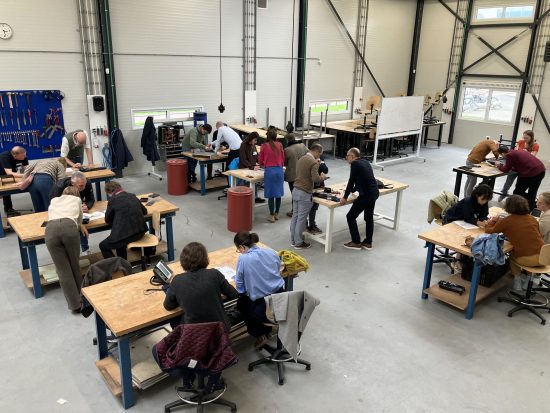We continue to highlight exemplary European initiatives taking decisive action to reduce e-waste. One of them is the E6 Project — Ecosystems for the Extended Lifetime of End-of-Use Electrical and Electronic Equipment.
About the E6 project
The E6 project—Ecosystems for Extended-lifetime of End-of-Use Electrical and Electronic Equipment—addresses the fast-growing challenge of Waste from Electrical and Electronic Equipment (WEEE) in North-West Europe (NWE), driven largely by shorter product lifecycles.
E6 pilots repair, reuse, and refurbishment (RRR) ecosystems with the goal of strengthening regional capacity to manage end-of-use electrical and electronic equipment more sustainably. The project focuses on creating both physical and digital infrastructures that make it easier for citizens to repair and reuse their devices instead of discarding them.
Each participating region brings unique challenges and opportunities, making transnational cooperation essential. By sharing experiences, tools, and good practices, E6 is building local circular models for electronic equipment that can be scaled across Europe.
The ultimate aim is to develop tools, capacity-building schemes and replicable (awareness raising) strategies that embed repair, reuse, and refurbishment into everyday life; driving a systemic shift towards circularity of electronic and electrical equipment in European regions.
Focus area: repair, reuse and refurbishment
E6 places its main emphasis on repair, reuse, and refurbishment (RRR) of electrical and electronic equipment. The project’s ecosystems help extend product lifespans, reduce waste, and create circular business opportunities.
By making RRR services more accessible (through repair cafés, reuse stations, and digital support hubs) E6 encourages both citizens and organisations to view old electronics not as waste, but as resources that can be recovered, repaired, and reused.
Key achievements
One notable success comes from The Hague, one of E6’s partner cities. During a recent awareness event, the city piloted innovative RRR features at its waste station:
- A repair café and second-hand shop were installed directly before the waste compactor, giving residents the opportunity to repair or donate items instead of throwing them away.
- Secure drop-off points for phones, laptops, and tablets enabled safe data disposal and encouraged citizens to declutter responsibly.
- Flyers were distributed linking residents through mapping to nearby repair cafés and second-hand stores, supporting long-term behavioural change.
Outside City Hall, a powerful visual display—a container filled with 5,130 kg of e-waste (the amount collected daily in The Hague)—highlighted the city’s annual total of 1.8 million kg. A city map showcasing local repairers and reuse outlets illustrated practical alternatives available to citizens.
This pilot is part of a broader two-week campaign to boost public engagement in circular practices and promote a culture of reuse and repair in The Hague.
How to get involved
E6 offers several ways to participate or support its mission:
- Learn and share: help raise awareness about repair, reuse, and refurbishment as accessible and sustainable alternatives to buying new.
- Use the digital service hub: this multi-component tool provides mapping, repair guides, data, and instructions for citizens and repairers, supporting RRR implementation across regions.
- Explore business models: E6 validates circular business approaches that make repair and refurbishment economically viable.
- Stay connected: sign up for the E6 newsletter by contacting Leona McGee (leona.mcgee@ernact.eu) or visit the official website at https://e6.nweurope.eu/
Partnering with EWWR
Although E6 is not formally participating in this year’s European Week for Waste Reduction (EWWR), all 19 project partners have been informed and encouraged to engage.
E6 particularly values EWWR’s focus on awareness creation, a goal shared by both initiatives. Raising public understanding of repair and reuse is essential for changing consumption patterns and reducing electronic waste.
E6 advice to EWWR action developers:
Connect with national platforms and large-scale projects like E6 to amplify impact, share tools, and build stronger networks for waste prevention and circular innovation across Europe.
 EN (full site)
EN (full site) ITA
ITA FRA
FRA POR
POR ESP
ESP CAT
CAT DEU
DEU NED
NED HUN
HUN